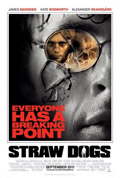New adaptation of ‘Straw Dogs’ is great success


With his audacious paean to the old west in “The Wild Bunch,” Sam Peckinpah unleashed a vision of reality that audiences rarely found reassuring and if they did, we may have found that in and of itself to be disconcerting.
Here we sit 40 years on with a reintroduction to Peckinpah’s own “Straw Dogs” by way of writer/director Rod Lurie’s modern vision of the tale of a man who is assaulted by demons (inner and outer) to the point where he must confront the limits of his reliance on “good manners” and “society” to fight his battles for him.
David Sumner (James Marsden “X-Men,” and a product of Putnam City North) is a modestly successful L.A.-based screenwriter who accompanies his wife Amy (Kate Bosworth “Wonderland” and “The Rules of Attraction”), a modestly successful actress, as she returns home to Blackwater, Miss., after the death of her father.
The Sumners set up shop so that David can devote time to writing his next script.
Amy, we begin to find, is a product of the deep southern culture of guns, God and gridiron football. David’s closest flirtation with the sport, however, is the annual Harvard-Yale game he passively attended in college.
To say he is a “fish out of water” is to say that a leper may not quite fit in at a nudist commune.
David and Amy patronize Blackwater’s local watering hole, home to more shattered dreams and drunken machismo than a “Jersey Shore” look-a-like convention.
There they meet Amy’s old high school flame Charlie (Alexander Skarsgård “True Blood”) and it’s clear (even in braille) that Charlie has failed to move on.
The condescending friendliness of David, the predatory leering of Charlie and the inability for Amy to show us that she herself has moved on set the stage for a series of collisions that will shake the Sumners to their core.
James Woods (“Videodrome” and “The Virgin Suicides”) plays the town “legend” in “retired” football coach Ted Heddon, whose bubbling vitriol serves as the catalyst for the film’s climactic finale.
Lurie’s adaptation of the 1971 original is admittedly watered down and is not without its flaws, yet it stands up on its own for a contemporary audience.
The psychological conflict within both David and Amy and the external conflict between David and Charlie keep the audience engaged and Lurie’s script develops its characters perfectly.
Marsden and Bosworth are strong while Skarsgård anchors the conflict well. Wood’s performance is pristine and he may have successfully portrayed his most frightening role to date.
The tension is paced beautifully and you grow to despise Charlie and his gang of yokel sycophants.
The best parts, however, come in the form of two of the best pay-offs I’ve been witness to in some time: that of a protagonist’s evolution that is truly gripping and the demise of a villain that is oh-so-gratifying to behold.
“Straw Dogs” is an experiment in testing the limits of the social restrictions we place on ourselves in order to “get along.”
“Straw Dogs” is also one of the better remakes I have seen in many years.
Rating: A
To contact Sean M. Tolbert, email sportswriter@occc.edu.